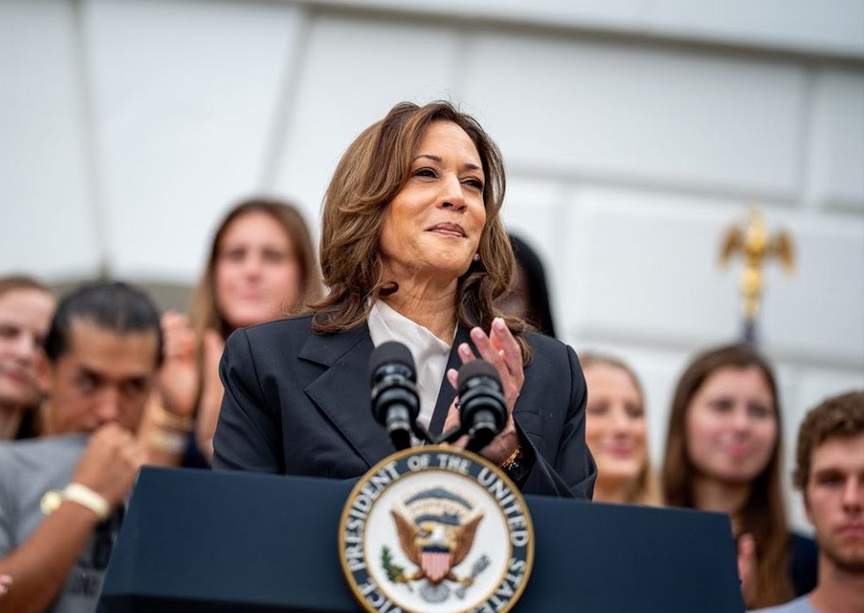Vice President Kamala Harris is enjoying a surge in the polls, leading former President Donald Trump nationally and in key battleground states. However, critics are questioning whether her growing lead is inflated by polls that oversample Democratic voters. Some suggest this could be a deliberate tactic to boost her momentum and fundraising efforts.
Democrats are celebrating Harris’s unexpected rise since she replaced President Biden on the ticket on July 21. While Trump had been maintaining a consistent lead against Biden, Harris has pulled ahead, now leading Trump by nearly 2 points nationally and either tying or leading in all seven battleground states. Despite this, GOP analysts argue that many polls are skewed by sampling fewer Republicans than participated in the 2020 election, which could give Harris a misleading advantage.
Critics contend that the oversampling of Democrats may be a strategy to generate enthusiasm and increase fundraising for Harris. The Harris campaign recently announced raising $540 million in July, more than four times the amount raised by Trump during the same period. Trump, confronted with this unexpectedly close race, dismissed the polls as “fake news” at a Michigan rally, accusing them of being manipulated. “They can make those polls sing,” he said.
Polling expert Frank Luntz has echoed similar concerns about Harris’s recent debate performance and her polling numbers. During a CNBC segment, Luntz stated, “I was surprised, quite frankly. I was not impressed as an observer and someone who was expecting more from her with this much time to get prepared.” He suggested that Harris’s performance in her CNN interview indicates she would likely lose a debate against Trump.
The latest Suffolk University/USA Today poll released Thursday shows Harris with a five-point lead over Trump, a notable eight-point turnaround from June when Trump led Biden by four points. This poll, like others showing a Harris lead, included a higher percentage of Democratic respondents—37.1% Democrats compared to 33.8% Republicans. Furthermore, 48% of those polled said they voted for Biden in 2020, compared to 41.6% who said they voted for Trump, raising further questions about the polling methodology.
Another poll by Yahoo News and YouGov released on August 27 also showed Harris ahead of Trump by a narrow margin, with 33% of participants identifying as Democrats and 29% as Republicans. Notably, this percentage of GOP respondents is below the 2020 exit poll data, which showed 36% of voters identifying as Republican. Critics argue that this discrepancy in sampling could be skewing the results in Harris’s favor.
Jim McLaughlin, Trump’s pollster, highlighted these discrepancies, saying, “They undersample Republicans,” which he believes is an attempt to “tamp down support and donations for Trump.” This skepticism is shared by other analysts who question Harris’s ability to rise in the polls without a significant improvement in her historically low approval ratings, which have only slightly increased since she began her presidential campaign.
Recent numbers from conservatively run pollsters, such as Trafalgar Group, tell a different story. Their latest data shows Trump leading Harris by 3 points nationally, with Trump at 47% and Harris at 44%. Trafalgar’s methodology, which often includes a more balanced sample of Republican and Democratic voters, contrasts sharply with the mainstream polls showing Harris in the lead. Another conservative-leaning poll from Rasmussen Reports also places Trump ahead of Harris by 2 points, further questioning the validity of her purported advantage.
FiveThirtyEight currently calculates Harris’s approval rating at 42.3%, a modest improvement from 37.1% in early July. Polling comparisons are also being drawn to the 2016 and 2020 elections, where surveys showed higher support for Democrats than what was ultimately reflected in the election results. Suffolk Poll Director David Paleologos defended the current polling methods, arguing that the Democratic advantage seen in these polls mirrors the 2016 election exit polls, which could be a more accurate reflection of the 2024 electorate than the pandemic-impacted 2020 exit polls.
Paleologos also emphasized that the inclusion of more Biden voters does not directly correlate to oversampling, as the sample includes those who didn’t vote, chose third-party candidates, or declined to disclose their vote. He noted that party identification is not fixed and can fluctuate due to various factors, including excitement about candidates or specific ballot measures, making it a “fluid, moving target.”
Despite the controversy over sampling, polling experts like Tony Fabrizio, Trump’s chief pollster, argue that these methods might be used intentionally to suppress support for Trump. “Once again, we see a series of public surveys released with the clear intent and purpose of depressing support for President Trump,” Fabrizio stated in an internal memo.
Analysts like Ryan James Girdusky have pointed out that other recent polls, including those from Fairleigh Dickinson University and NPR/Marist College, show Harris leading Trump among senior voters—a demographic that has historically leaned Republican. Girdusky attributes this to response bias, where older, more liberal voters are overrepresented, skewing the results in Harris’s favor. He suggests that Harris’s marginal lead could be fragile, relying on a voter group she is unlikely to win by such a wide margin.
As the election season progresses, the debate over polling accuracy and methodology continues to fuel discussions about the true state of the race. With less than 70 days until the election, questions remain about the reliability of polls that show Harris leading and whether these trends will hold as voters head to the polls.

